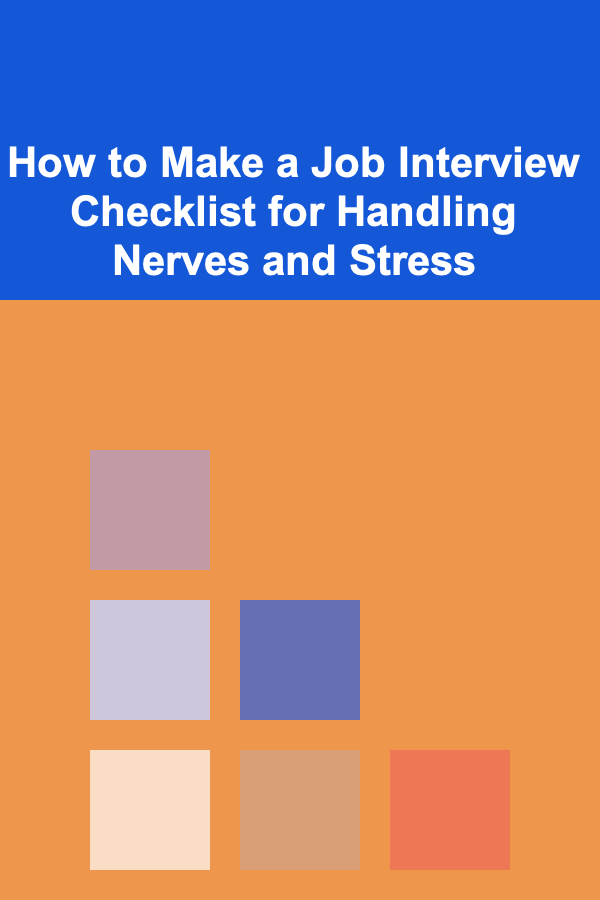
How to Make a Job Interview Checklist for Handling Nerves and Stress
ebook include PDF & Audio bundle (Micro Guide)
$12.99$11.99
Limited Time Offer! Order within the next:

Job interviews can be one of the most stressful experiences in a professional's life. The pressure to present your best self, the anticipation of tough questions, and the fear of rejection can easily overwhelm even the most experienced candidates. However, managing nerves and stress is key to performing well during the interview. By preparing ahead of time, you can reduce anxiety and approach the interview with a calm and confident mindset.
This guide will walk you through creating a practical job interview checklist designed to help you handle stress and perform your best. With actionable steps and strategies, you'll learn how to control your nerves, stay focused, and approach your interview with a sense of readiness.
Pre-Interview Preparation: Setting Yourself Up for Success
Before the interview even begins, there's a lot you can do to prepare. The more prepared you are, the less you'll feel anxious when the day arrives.
Actionable Steps:
-
Research the Company Thoroughly: Understanding the company's values, mission, culture, and the specific role you're applying for will help you feel more confident. Knowing what the company stands for allows you to tailor your responses in a way that resonates with the interviewers.
- Look for recent news, updates, or press releases about the company.
- Understand the job description and how your skills match the role.
-
Prepare for Common Interview Questions: Practice answering questions that are commonly asked in interviews, such as "Tell me about yourself" or "What are your strengths and weaknesses?". Having a set of prepared answers will help you feel more confident when these questions arise.
- Prepare examples of your accomplishments, skills, and experiences that align with the role.
- Practice with a friend or family member, or record yourself to review your responses.
-
Dress the Part: Choose your outfit ahead of time based on the company culture and the position. Dressing appropriately not only helps you make a good first impression, but it also gives you confidence.
- Choose professional, well-fitting clothes that align with the company's environment.
- Make sure your clothes are clean and ironed, and avoid anything too flashy or distracting.
-
Plan for the Logistics: Ensuring that everything runs smoothly on the day of the interview can help ease your nerves.
- Know the time, location, and format of the interview (in-person, virtual, or phone).
- Plan your route if the interview is in person, allowing extra time for traffic or delays. If it's virtual, test the technology beforehand to avoid technical issues.
Questions to Ask Yourself:
- Have I researched the company thoroughly?
- Have I practiced my answers to common questions?
- Do I feel confident in my attire and how I'll present myself?
Mental Preparation: Building Your Inner Calm
Even with all the physical preparation in the world, your nerves can still get the best of you if you don't take care of your mental state. Managing stress and building mental resilience are crucial in helping you stay composed during the interview.
Actionable Steps:
-
Practice Relaxation Techniques: Stress-relief exercises, such as deep breathing, meditation, or mindfulness, can help calm your nerves before and during the interview.
- Try a few minutes of deep breathing exercises before the interview to help reduce physical tension and lower your heart rate.
- Use guided meditation or mindfulness apps to prepare your mind for a calm and focused state.
-
Reframe Negative Thoughts: It's easy to fall into negative thinking patterns, such as worrying about what could go wrong or fearing rejection. Reframe these thoughts into more positive and realistic ones.
- Instead of thinking, "I'm going to mess up," reframe it as, "I've prepared well, and I'm capable of handling this."
- Remember that interviews are a two-way conversation, not an interrogation. You're there to see if the company is a good fit for you just as much as they're assessing your fit for the role.
-
Visualize Success: Take a moment to imagine yourself walking into the interview room with confidence. Visualize yourself answering questions smoothly, connecting with the interviewers, and leaving the interview feeling accomplished.
- This technique can trick your brain into feeling more prepared and less anxious.
-
Accept Nervousness: Acknowledging that it's normal to feel nervous can actually make those feelings less overwhelming. Remind yourself that nerves are a sign you care and want to do well.
- Embrace the feeling of nervousness as a natural part of the process.
Questions to Ask Yourself:
- Have I practiced relaxation techniques to calm my nerves?
- Am I reframing any negative thoughts or self-doubt into positive affirmations?
- Have I visualized a successful interview scenario?
During the Interview: Managing Stress in Real-Time
When the interview begins, it's time to stay present and manage your stress on the spot. The way you handle your nerves during the interview can make a significant difference in how you perform.
Actionable Steps:
-
Take Your Time: Don't feel rushed to answer questions immediately. It's okay to take a few seconds to gather your thoughts before responding.
- If you don't understand a question, ask for clarification rather than guessing or getting flustered.
- Take a deep breath before answering. This can help you regain focus and reduce anxiety.
-
Use Positive Body Language: Your body language communicates just as much as your words. Open, confident body language can not only make you appear more competent but can also help you feel more confident.
- Maintain eye contact, offer a firm handshake, and sit up straight.
- Avoid crossing your arms, fidgeting, or appearing distracted.
-
Stay Focused on the Present: It's easy to get caught up in the "what ifs" of the situation. Try not to dwell on potential mistakes or think too far ahead. Focus on answering the question at hand.
- If you lose your train of thought, pause, take a deep breath, and start again. Everyone makes mistakes, and the interviewers will appreciate your poise.
-
Practice Active Listening: Listening carefully to the interviewer's questions will help you respond more thoughtfully and reduce your chances of misinterpreting them.
- Nod to show you're listening, and paraphrase the question to ensure you understand it before you begin answering.
Questions to Ask Yourself:
- Am I giving myself permission to take a moment before answering questions?
- Am I using open body language to convey confidence?
- Am I staying focused on the present conversation rather than overthinking past or future scenarios?
Post-Interview: Reflecting and Decompressing
After the interview, it's important to decompress and reflect on the experience. This not only helps you handle stress in a healthy way but also allows you to improve for future interviews.
Actionable Steps:
-
Reflect on Your Performance: Take a few minutes to think about what went well and what could have been improved. This will help you grow from each interview experience.
- Focus on positive aspects, such as how well you answered certain questions or how confident you felt during parts of the interview.
-
Release Any Remaining Tension: If you're still feeling stressed or anxious after the interview, engage in an activity that helps you relax and unwind.
- Go for a walk, do some light exercise, or practice more breathing exercises to help clear your mind.
-
Send a Thank-You Note: Writing a thank-you note is a simple but powerful way to express gratitude and reinforce your interest in the position. It's also an opportunity to reiterate your qualifications.
- Send the thank-you email within 24 hours of the interview, referencing specific points discussed during the conversation.
Questions to Ask Yourself:
- What went well during the interview, and how can I build on that for next time?
- Did I take time to decompress and relieve any remaining stress?
- Have I sent a thank-you note to express appreciation for the opportunity?
Conclusion
Handling nerves and stress during a job interview requires a combination of preparation, mental resilience, and practical strategies. By taking proactive steps to prepare thoroughly, manage stress in real-time, and reflect after the interview, you can approach each interview with confidence and calmness. Remember, nerves are a natural part of the process, but with the right tools, you can turn that energy into a powerful performance.

How to Leverage Your Certifications on Your Resume
Read More
How to Make Money Online as a Firefighter: 10 Actionable Ideas
Read More
How to Store and Organize Stamps and Dies
Read More
How to Use Lighting to Deter Criminals from Targeting Your Home
Read More
Show, Don't Tell: How to Stand Out by Demonstrating Your Value
Read More
The Call Center Representative's Guide: Mastering Customer Service Excellence
Read MoreOther Products

How to Leverage Your Certifications on Your Resume
Read More
How to Make Money Online as a Firefighter: 10 Actionable Ideas
Read More
How to Store and Organize Stamps and Dies
Read More
How to Use Lighting to Deter Criminals from Targeting Your Home
Read More
Show, Don't Tell: How to Stand Out by Demonstrating Your Value
Read More